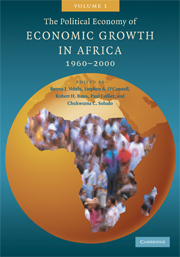Book contents
- Frontmatter
- Contents
- List of figures
- List of tables
- List of contributors
- Foreword
- List of acronyms
- PART 1 OVERVIEW
- PART 2 INTERPRETATION
- 4 Domestic interests and control regimes
- 5 Sacrificing the future: intertemporal strategies and their implications for growth
- 6 The political geography of redistribution
- 7 Political conflict and state failure
- 8 Shocks, risk, and African growth
- PART 3 EXPLANATION
- PART 4 LOOKING AHEAD
- Index
- References
4 - Domestic interests and control regimes
Published online by Cambridge University Press: 09 January 2010
- Frontmatter
- Contents
- List of figures
- List of tables
- List of contributors
- Foreword
- List of acronyms
- PART 1 OVERVIEW
- PART 2 INTERPRETATION
- 4 Domestic interests and control regimes
- 5 Sacrificing the future: intertemporal strategies and their implications for growth
- 6 The political geography of redistribution
- 7 Political conflict and state failure
- 8 Shocks, risk, and African growth
- PART 3 EXPLANATION
- PART 4 LOOKING AHEAD
- Index
- References
Summary
Introduction
When imposing a control regime, a government seeks to displace the market as the primary agency for governing the economy. Either by manipulating the structure or operation of markets, or by replacing private markets with public bureaucracies, it seeks to shape the way in which land, labor, and capital are allocated; commodities produced and distributed; services furnished; and incomes determined.
This chapter details the policies that characterize regulatory regimes and documents their economic impact. Stressing the economic costs inflicted by the imposition of control regimes, the chapter asks: given their magnitude, why did governments pursue such policies? And having chosen to regulate their economies, why did governments persist in this decision? The answers it offers not only shed light on why governments may impose control regimes, then, but also on the politics of policy reform.
In analyzing the content of control regimes, this chapter draws on two sets of data. One is the classification of policy syndromes developed by the research teams; the other is an account of the policy choices of twenty-eight African governments published by the World Bank (1994). In its 1994 report, the Bank audited the measures taken by its sample set of governments to regulate financial markets, industries, trade, and services. To illustrate the content of control regimes, the chapter compares the measures taken by governments judged to have implemented control regimes with those judged not to have done so, as documented in the World Bank's report (1994).
- Type
- Chapter
- Information
- The Political Economy of Economic Growth in Africa, 1960–2000 , pp. 175 - 201Publisher: Cambridge University PressPrint publication year: 2007
References
- 5
- Cited by



